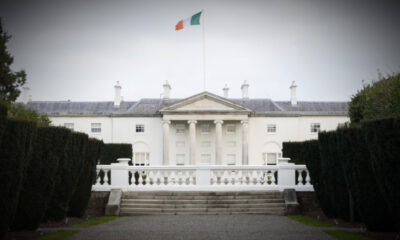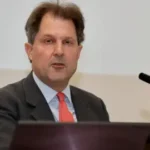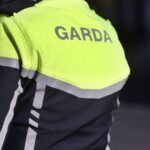Breaking News
Police used journalists’ phone data to detect leaks by staff, report says
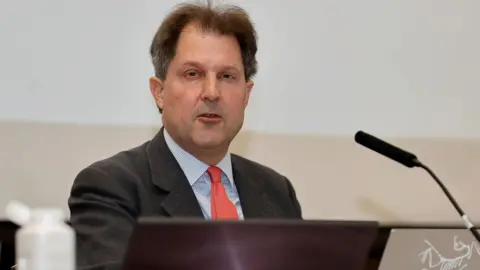
Read more on post.
Julian O’NeillBBC News NI crime and justice correspondent
Concerns have been raised over how the Police Service of Northern Ireland (PSNI) used journalists’ phone numbers to check for any leaks of information by its officers or staff.
A 200-page report also revealed there were 21 unlawful uses of covert powers to attempt to uncover reporters’ sources – double the figure previously disclosed.
Its author, lawyer Angus McCullough KC, said he found that the PSNI’s surveillance of journalists and lawyers is not “widespread or systemic”.
PSNI Chief Constable Jon Boutcher said the report “rightfully highlights that we have to improve our processes, and we will”.
Mr Boutcher added that he was “pleased” that the review did not identify systemic surveillance, but did find “individual authorisations where we as a police service could have done better”.
In the report, Mr McCullough was critical of “particular instances” and “some areas of practice”.
The report covered PSNI surveillance practices between 2011 and 2024.
Last year, Mr McCullough was asked to carry out an independent review by Mr Boutcher.
It followed legal action by journalists Barry McCaffrey and Trevor Birney and allegations that other journalists, and lawyers, might have had their phones monitored.
The PSNI previously admitted 10 attempts to use the communications data of journalists to try to identify their sources.
But the report found 21 instances, all pre-2015, which are “considered unlawful” and which relate to eight journalists, including Mr McCaffrey.
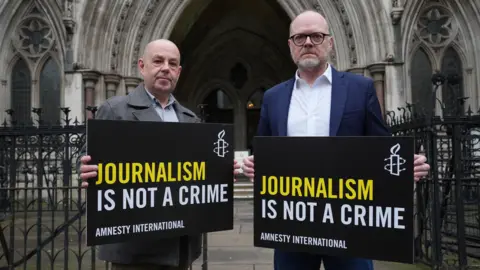 PA Media
PA MediaIn 2017, Mr Birney and Mr McCaffrey produced a documentary about the loyalist murders of six Catholic men as they watched a football match in a pub in Loughinisland in County Down in 1994.
No Stone Unturned was made by Belfast-based production company, Fine Point Films and directed by Oscar winner, Alex Gibney.
It examined how the Royal Ulster Constabulary (RUC) handled the case and made use of confidential documents from the Police Ombudsman for Northern Ireland (PONI) – a watchdog which investigates police conduct.
The PSNI treated the leak of PONI documents as theft.
A year later the two journalists were arrested.
They said their arrests were “an attack on the press” and challenged the way they were treated in court, winning substantial damages amounting to £875,000.
However, through legal disclosure material surfaced which revealed details of surveillance against them and other journalists.
Speaking on BBC Radio Ulster’s Talkback programme, Mr McCaffrey called for a public inquiry.
He said this would allow Northern Ireland Secretary Hilary Benn to “put the public confidence back in policing”.
Mr Birney welcomed the report but said his and Mr McCaffrey’s lawyers had not had a chance to “cross-examine the PSNI” and “review those documents… and test them against the law”.
Freedom of expression
Speaking at the report’s launch, Mr McCullough said there had been concerns of the effect the arrests could have on investigative journalism in Northern Ireland.
“Two journalists who had been investigating mass murder and allegations of state collusion had been arrested and subject to covert measures and surveillance of a suspected source”, the barrister said.
“The right of freedom of expression – including the freedom for journalists and civil society to examine the actions of the state – is fundamental to democracy.”
‘Lack of awareness’
The report also raised issues around the use of journalists’ phone numbers, which had been provided to the PSNI’s press office.
Between 2011 and 2023, the numbers were “washed through” police systems to detect any unauthorised contact between PSNI officers or staff and journalists.
This was referred to as pro-active “defensive operations” against leaks.
At one point, in 2011, it involved checking 65,000 calls against 383 journalists’ numbers.
The report states: “No legal advice appears to have been sought in relation to the legality or propriety of the practice.
“There seems to have been a lack of awareness until very recently that it might give rise to issues in relation to data protection and the rights of those whose data was being used unknowingly.
“This practice does not appear to have been necessary or proportionate.
“The scale and duration of defensive operations is a significant concern.”
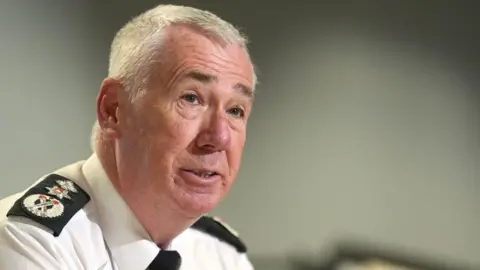 PA Media
PA MediaMr McCullough said the PSNI should consider self-reporting the matter to the UK’s data protection watchdog, the information commissioner.
He noted the practice was only formally discontinued in May of last year.
Investigative journalist Donal MacIntyre is named in the report as having been the subject of directed surveillance following posts he made on social media.
He is working on a documentary about the disappearance and death of schoolboy Noah Donohoe.
There was an unease that the X posts “created a serious risk of prejudice” to upcoming inquest proceedings.
Mr McCullough said he is concerned about the process that led to the surveillance being authorised, but added he found “no indication” that Mr MacIntyre’s private communications with Noah’s mother had been accessed.
Mr McIntyre said he was “shocked at the lackadaisical and lamentable processes that led the PSNI to authorise covert surveillance of [his] social media accounts”.
He said he was “relieved” that the review found his communications with Noah’s mother were not accessed.
However, he added that the findings exposed “profound institutional failings in the PSNI’s approach to covert surveillance” and raised “grave concerns” about the intrusion into his work and “the wider and potentially unchecked use of these powers in Northern Ireland”.
The report also found two instances of directed surveillance against an unnamed lawyer, including in a court building, without proper authorisation.
Mr McCullough did not examine any cases currently at the Investigatory Powers Tribunal, including MI5-conducted phone surveillance of journalist Vincent Kearney while he worked at the BBC.
‘Appropriate use of powers’
Mr Boutcher said that “properly exercised covert powers” had “an important role to play” in detecting, investigating, prosecuting and preventing crime.
“Mr McCullough makes reference to being struck by the utility of these powers in keeping the public better protected from a range of threats including organised crime, terrorism, paedophile rings and large scale drug supply,” he said.
Mr Boutcher said that “appropriate, lawful and proportionate use of these powers” keeps people safe and “builds confidence in policing”.
Breaking News
Manhunt under way for prisoner who escaped from Garda station on Monday
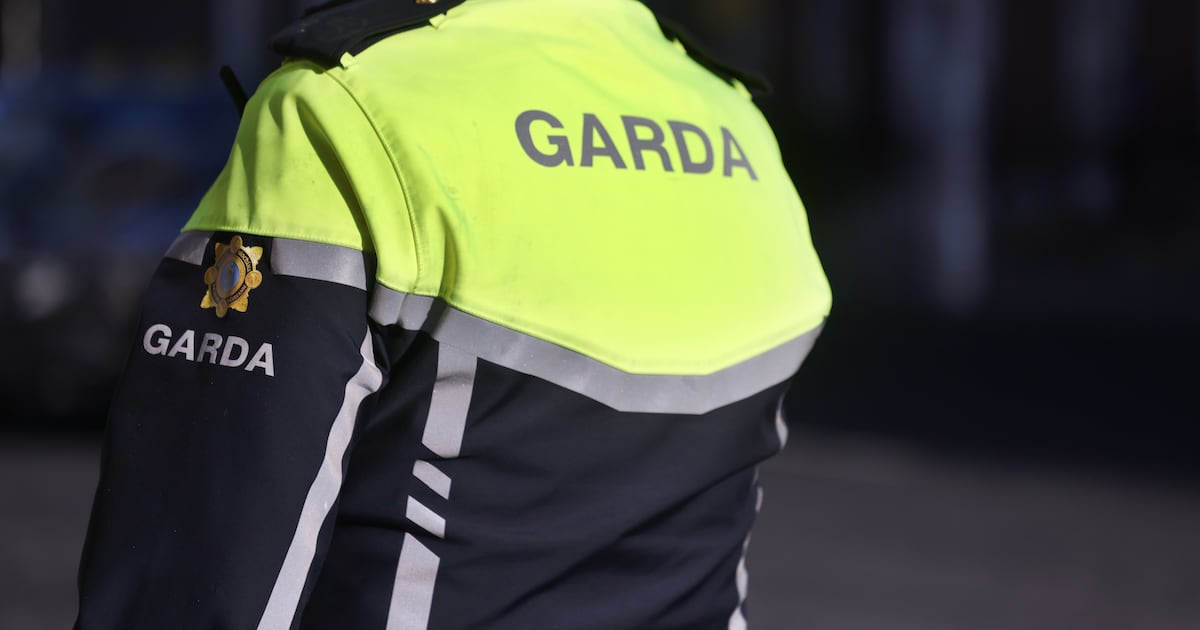
Read more on post.
Gardaí are searching for a man suspected of involvement in the drugs trade after he escaped from a Garda station.
He had been arrested for questioning during an operation last Thursday and was in custody. He escaped on Monday.
The suspect, who is in his 40s and has been a target for gardaí in Kilkenny, appears to have taken advantage of an unsecured area of the station campus.
Gardaí are concerned he has had help and will have the resources to flee abroad. Efforts are being made to ensure he cannot leave the country through the main ports or airports.
The man is considered a significant figure in the regional drugs trade and is suspected of directing others in the commission of crime. He was detained last Thursday in a planned operation following an investigation into the activities of a gang based in southeast Leinster with reach into parts of Munster.
While investigations to determine precisely how the suspect escaped from custody continue, gardaí believe there was a lapse in a usually secure area at Kilkenny station.
Though he fled of his own volition, he has a significant number of criminal contacts in the area who are believed to have aided him afterwards.
He was being interrogated during a prolonged maximum period of detention for questioning granted to gardaí due to the seriousness of the allegations against him.
In reply to queries, Garda Headquarters on Wednesday confirmed a prisoner escape was under investigation but did not provide details.
“Gardaí are investigating the escape from Garda custody of a male, aged in his 40s, on Monday, September 22nd, from a Garda station in the eastern region,” the Garda said.
Though escapes from Garda custody – or from prison custody, usually on medical visits or other escorts – are not unprecedented in the State, they are rare and treated very seriously. Many of those who have escaped have been located and arrested within days.
However, more senior criminals with access to significant funds pose a greater challenge as they have the resources to evade gardaí for long enough to flee the country.
The escape of the suspect in Kilkenny is an embarrassment for the Garda and a significant manhunt has been under way since Monday night.
Breaking News
Bloody Sunday: Judge rules evidence against soldier charged is admissable
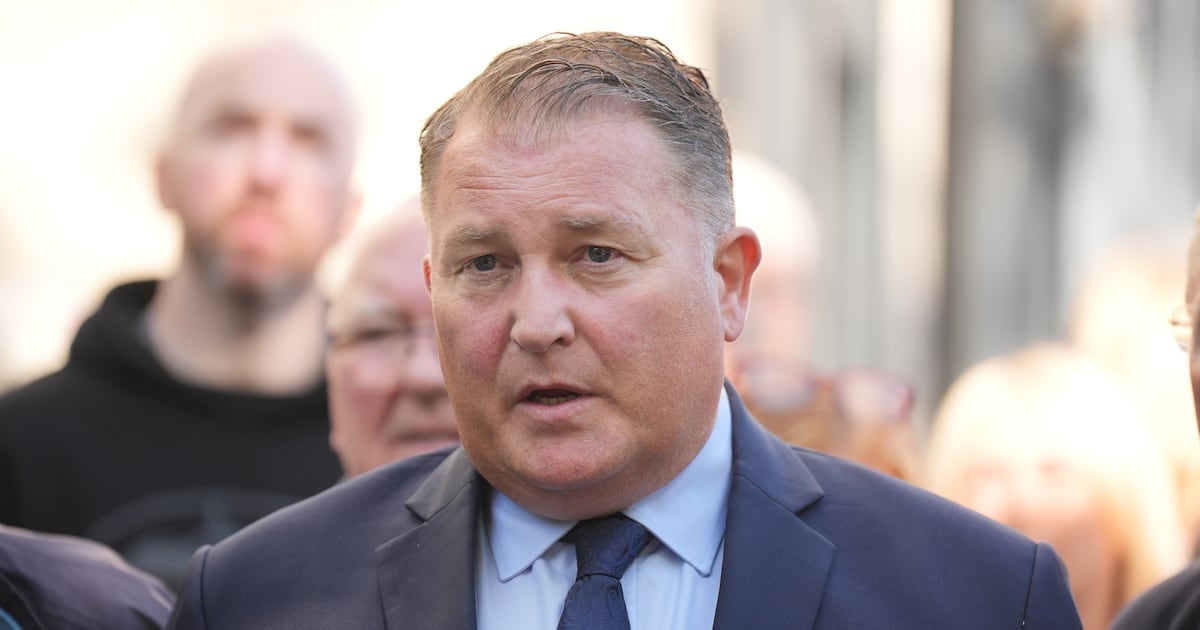
Read more on post.
A judge has ruled that key evidence against the soldier charged with murder and attempted murder on Bloody Sunday will be admissible in his trial.
Soldier F, a former member of the British army’s elite Parachute Regiment is charged with the murders of James Wray and William McKinney and five counts of attempted murder in Derry on January 30th, 1972. He denies the charges.
Thirteen people were killed when members of the British army’s elite Parachute Regiment opened fire on anti-internment marchers in Derry’s Bogside on what became known as Bloody Sunday. A 14th died later.
Last week Judge Patrick Lynch heard legal arguments about the admissibility of hearsay statements attributed to two other soldiers, G and H, made in the immediate aftermath of Bloody Sunday and to the 1972 Widgery Inquiry.
Delivering his ruling at Belfast Crown Court on Wednesday, the judge said that the prosecution case, “by their own acknowledgment, is totally dependent on the hearsay statements” of the two former soldiers.
Having “carefully considered the arguments”, he said he had determined they should be admitted into evidence in the case.
Judge Lynch said at this stage it would be “inappropriate” to give reasons for his decision.
“I am not only judge in relation to legal issues but also the tribunal of fact, with the ultimate responsibility of determining guilt or innocence based upon such facts as I decide have been proven to the criminal standard, that is, beyond reasonable doubt,” he said.
“I shall therefore not give reasons at this stage for the admission of the statements but shall do so in due course, if necessary.”
[ After 53 years, Bloody Sunday families march to court ‘with heads held high’Opens in new window ]
The trial was adjourned until Friday, with the court expected to hear the remainder of the prosecution evidence – including from those injured on Bloody Sunday – from next week.
Speaking outside the court, solicitor for the Bloody Sunday families, Ciaran Shiels, said they were “very pleased that the judge saw merit in the prosecution’s submissions.
“They welcome very much the judgment and they look forward to the evidence starting to be called.”
Paul Young of the Northern Ireland Veterans’ Movement said the judge’s decision “will be met with great disappointment by the veterans who served in Northern Ireland”.
Soldier F is the first member of the British armed forces to face prosecution for his actions on Bloody Sunday.
He is the subject of a court order protecting his anonymity and cannot be identified.
Additional reporting – PA.
Breaking News
Significant reduction in most serious crime – CSO
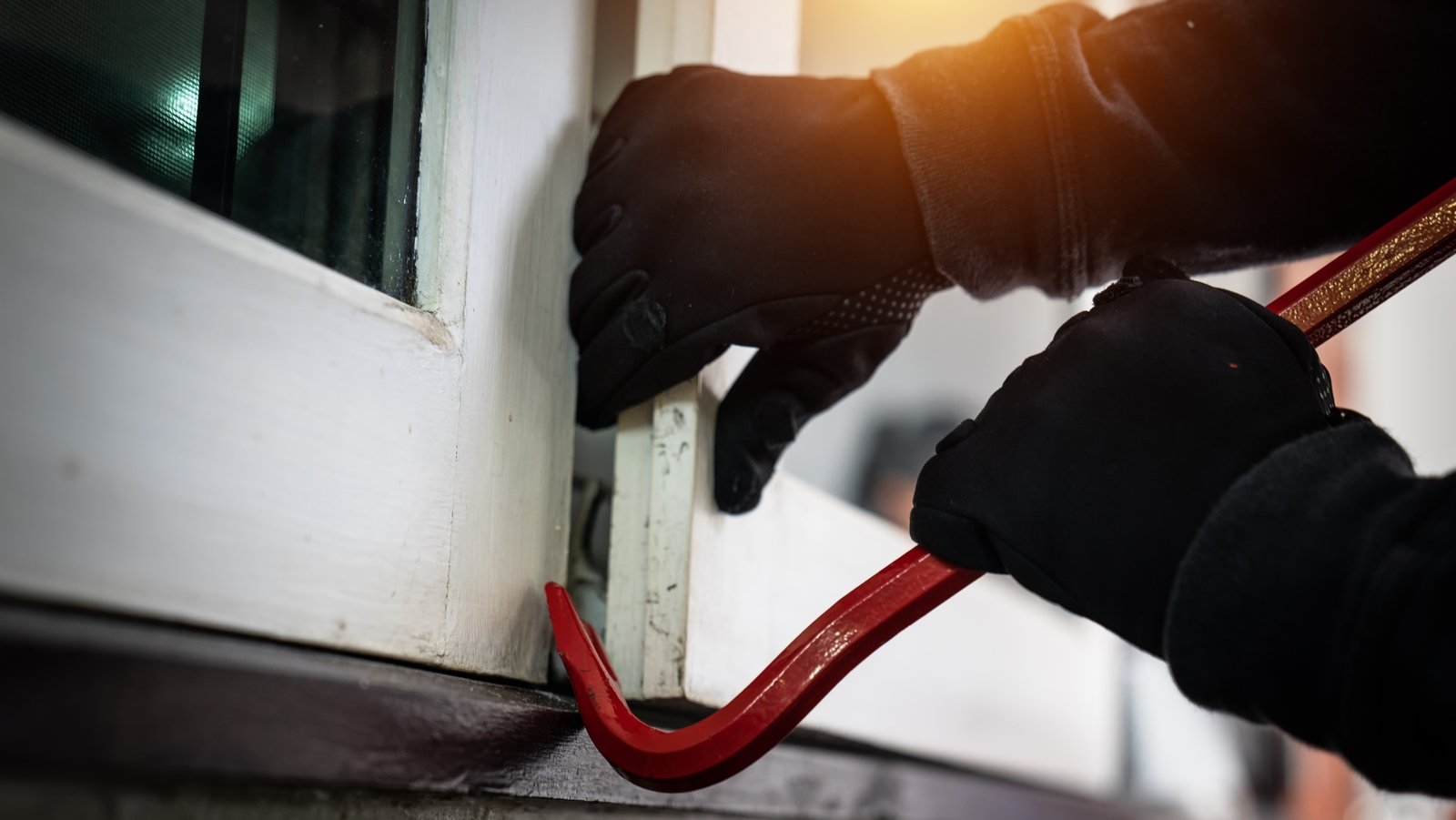
This post was originally published on this site.
There has been a significant reduction in most categories of serious crime according to the latest CSO crime figures published today.
Homicide, robbery, extortion, fraud and burglary offences were all down, but sexual offences increased by 17%
However the pattern for the last four years has also shown increases in robbery, weapons and theft offences, which increased by 30%.
Recorded crime fell in ten of the 14 categories of serious crime according to the latest CSO figures which compare the second quarter of this year with the same period last year.
Homicide and related offences, which includes gangland murder, was down 42%. Much of the decrease is due to the reduction in dangerous driving causing death offences. However the CSO says these can be revised over time.
There were also reductions in kidnapping and related offences, down 16%, robbery and extortion down 14%, burglary down 7% and drugs and theft offences, both down 2%.
However the CSO says that theft offences have increased over the four years from 2022 to 2025 by 30%, and there have also been increases in weapons and explosives offences up 19%, and robbery, extortion and hijacking up 14%.
Dangerous or negligent acts dropped by 14%.
Sexual offences also increased by 17% this year, but gardaí say this could also be related to an increase in reporting, particularly of historic sexual offences.
-
Breaking News1 day ago
Barack Obama to be conferred with freedom of Dublin at ceremony on Thursday
-
Culture1 day ago
Taylor Swift’s new cinema outing generates more than €12million in just 24 hours
-
Breaking News1 day ago
Opinion: To be or not to be? Why it is time to drop Shakespeare’s compulsory status in Leaving Cert
-
Breaking News1 day ago
Minister rejects proposal to make Shakespeare optional in Leaving Cert English
-
Breaking News1 day ago
Families at risk of homelessness may have another chance to avail of tenant-in-situ scheme
-
Travel & Lifestyle2 days ago
The Best Way to See Rome? On a Running Tour at Sunrise
-
Business21 hours ago
JLR shutdown extended again as ministers meet suppliers
-
Politics1 day ago
European Parliament snubs Orbán with vote to shield Italian MEP from Hungarian arrest



